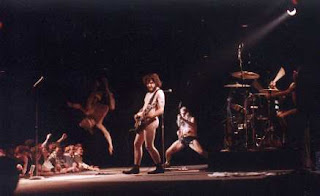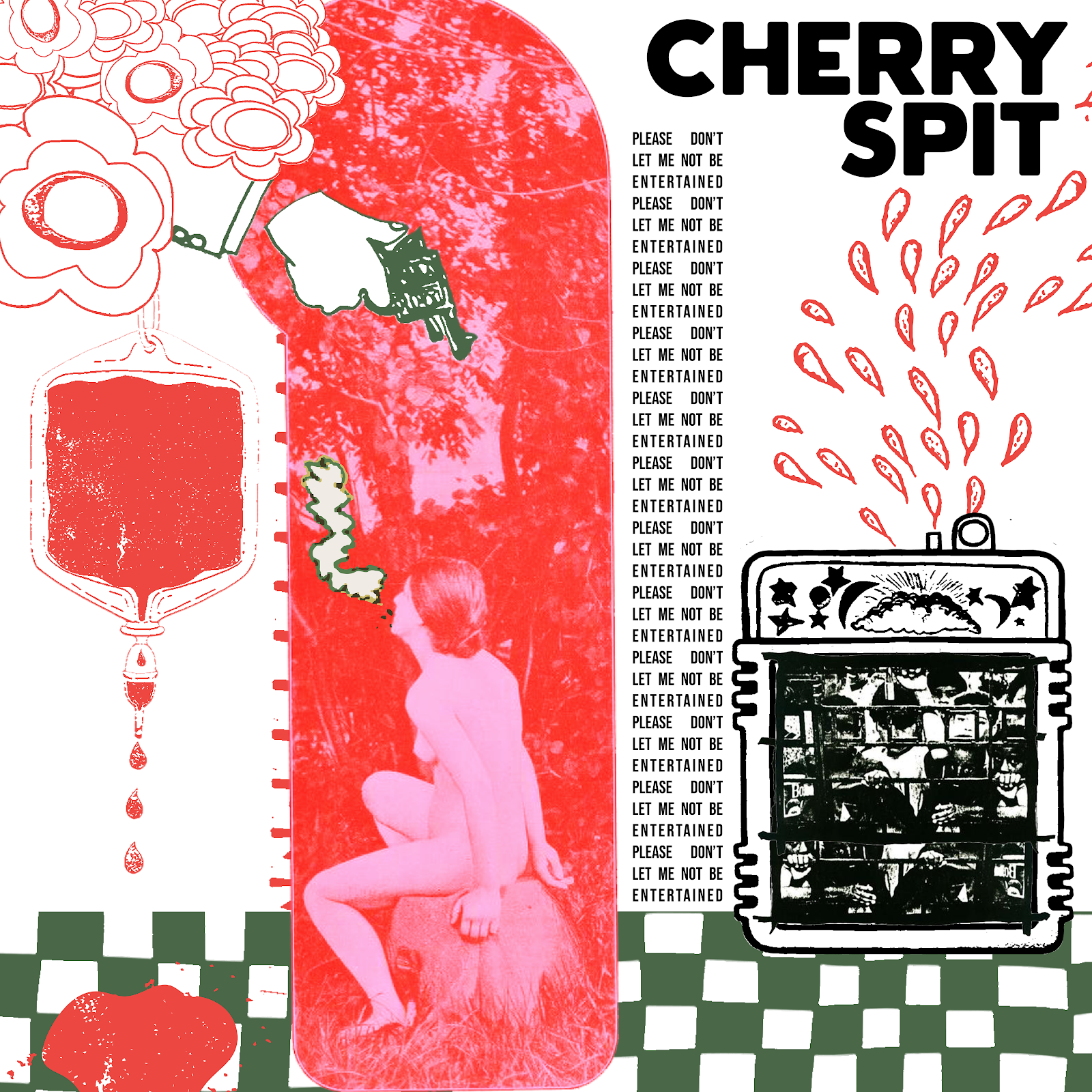When Black Flag was scheduled to play Denver's Rainbow Music Hall in April, 1984, your humble scribe here, in addition to working at Wax Trax, was also writing occasionally for Westword. The music editor at the time was Gil Asakawa and Westword was at the peak of its most Village-Voice-like glory. Patti Calhoun, Editor In Chief, Publisher and (I think) Owner, was tough, fair, committed, fearless.
Gil was a good guy and let me get away, not with everything, but a lot. A helluva lot! In true Wax Traxian spirit I was not just opinionated but absolutely reveled in the sort of stylistic excesses I had been infected with by deep immersion in the UK music press of the early 1980s -- especially the New Musical Express, Sounds and Melody Maker.
NME's Paul Morley was my model: erudite, fiercely polemical, brazenly intellectual, outrageously provocative -- I paddled my tiny canoe piled high with pages from Foucault, Derrida, Baudrillard, Lacan, Adorno and Benjamin in the wake of Paul Morley's mighty dreadnought of severe and demanding prose.
How short I came of the mark you will observe below...
Music Editor Gil knew, of course, that I was the one to write a piece announcing the Black Flag show -- it was not that I was the only one who even knew who the band was but I was probably the only one that liked them.
And so I got the nod: 1,000 words on this strange, sweaty, disturbingly sincere but frighteningly violent band from LA that seemed to attract more cops than fans at their shows.
 |
| Local Anesthetic (Wax Trax Fanzine-July 1982) |
Also, I had already seen Black Flag, a couple of years before in 1982 at the Mercury Cafe when it was around the corner from Wax Trax on 13th & Pearl.
That show had been a stunner! Two shows, actually: an afternoon show for all-ages and an evening show for the alcoholics... But those shows are another story.
This Westword piece hit the street the day before the show so I had no idea that the performance would go down in Denver Rock 'n' Roll History as the night Classic Rock Impresario Barry Fey would call in an airstrike on his own position! Yes, this was the night Nig Heist, opening for Black Flag came out on stage in their all-together and proved that nudism not only does not improve Rock 'n' Roll but isn't even remotely sexy.
Well, okay, here it is: Black Flag and Denver...
**************
Westword 4/24/1984
Flag Wavers
by Duane Davis
Listening to Black Flag is the moral equivalent of a dunking in an acid bath, where all the dross is eaten away, where the excesses of the soft, satisfied life are boiled off in a savage, single-minded reductionism that collapses experience to a single cry, a single rage, a single pain.
In other words, this is more than just another flashthrash hardcore punk band from LA.
The music's mind-boggling simplicity refuses all answers, denies all solutions, accepts no excuses. It demands that we turn and face ourselves, that we recognize that if we allow even one to suffer, then we all must suffer. The band offers no veils, no mediation between music and life, as it posits a vocabulary stripped to its barest terms, its simplest metaphors.
Within these astonishingly narrow confines, Black Flag inscribes a primer of raw, direct and immediately accessible emotion. It's a first-grade reader in which Dick and Jane and Spot are brought to bay in Hell; a propaedeutic in which love is revealed as sadism, concern as smothering rage, success as the exercise of arbitrary power, happiness as the refusal of responsibility.
Formed by guitarist Greg Ginn in 1977, Black Flag embodied the American reading of British punk. The band had a gloss that shifted the pace into hyperdrive with the music accelerating like a rhino on amphetamines -- an all-out, all-risk assault that burned its bridges through the sheer heat of movement. Three chords were a luxury, tuning a matter for dilettantes and hooks a sure sign of wimps.Enormous quantities of noise were jammed into one- and two-minute songs that had more to do with detonation than duration.
On the dancefloor, pogoing to Black Flag mutated from a solitary jumping up and down in your own private space to a volatile MX cross-hatching of bodies launched in pre-emptive strikes against all borders near and far. The stage no longer elevated a 'performer' who stood aloof and separate, but marked a target for destruction. In its simplest terms, the music offered 'adolescent adjustment crises' in the guise of holocaust, an escalation of growing pains into apocalyptic convulsion.
The Punks did not, of course, invent all this. They had grown up in a society bannered with terrorism, with hourly reports from the war zone that extended to every living room. They were simply raising the language of 'SWAT' and 'Starsky and Hutch' to the pitch of pain they felt mushrooming inside. If the world itself seem at the flash-point of self-immolation, what handier, more ready metaphor for personal pain than what you see on TV or read in the headlines?
But if hardcore was telling us nothing new when it said growing up is a tough proposition, its form for expressing such age-old homilies speaks volumes (pun intended). Its refusal of the rhetoric of awareness and understanding is a rough attempt at forcing the recognition of the impenetrable experience of each individual: if I tell you I am aware of how you feel, then I have defined what you are allowed to feel -- particularly if I'm in a position of power as parent or teacher.
Song after song offers a desperately naked and vulnerable narrative: 'Gimmie Gimmie Gimmie/ I need some more/ Gimmie Gimmie Gimmie/ Don't ask what for' and 'Don't you try pretending/ Everything's alright/ I just might start destroying/ Everything that's in my sight.' Clumsy, awkward, gauche, contradictory -- it's a fusion of words and music that contradicts the last musical decade exemplified by singer/songwriters such as Jackson Browne, James Taylor and Joni Mitchell.
The intent is not simply anti-social, it's virulently anti-psychological in its insistence that the '70s version of mental health was a fraud: group therapy, transactional analysis, strokes, gestalt, touchy/feely, getting it together, getting in touch with yourself and looking out for number one.
The music uncovers a vast, pervasive hoax masking the ongoing use of adolescence as a political and coercive label and the channeling of personal growth into roles acceptable to a producer/consumer society.
There's no doubt that the music's extremism leaves it open to all sorts of 'reasonable' questions. Why be ugly? Isn't there more to life than pain? Why no uplift? What about beauty and love and joy? Is this art?
But DAMAGED, Black Flag's 1982 debut lp, established a framework for grounding all these questions: when you ask such things, you can do so only because you think you already have an answer. The album is a landmark, a classic of dark, repressive rage that inhabits a narrow geography between nihilism and fascism; it offers an identity and role wholly Other than what conventional society instruct. The music -- its ideas, emotions and language -- structures a particular ontology, a specific way of being someone. For those, often young and without power, who desperately search for somewhere to belong, the fascination exercised by this music is great. It coalesces all their vague yearnings for freedom and purpose into a pure surface of action and image. What it wants is to be more than just right: it wants, simply, irrevocably, to BE.
The newest lp, MY WAR, (on the SST label), comes after a year-and-a-half of intense legal wrangling with Black Flag's former label, Unicorn, over the rights to release material. Two members of the band were sent to jail after authorizing the release of a double-album compilation of old songs called EVERYTHING WENT BLACK on SST. In addition, Dez Cadena and Chuck Dukowski left the band, leaving singer Henry Rollins and founder/guitarist Gregg Ginn to carry on.
The new material shows no sign of letting up, though. Every song is a provocation to reckless endangerment, a dense knotting of hardcore and heavy metal that weaves a tangled skein of isolation and paranoia, death fears and death wishes. As always with Black Flag, there's a breakdown between psychosis and catharsis, between the disease and its expulsion. This is the aporia of condition and metaphor, the exemplar of the undecidable, unresolvable (con)fusion of life and expressing.
And it's great rock and roll.
Black Flag w/ Meat Puppets & Nig Heist, April 25, 7:30pm, Rainbow Music Hall, Select-A-Seat, 778-0700, $6.
PS. yes, that Rainbow marquee is for a different Black Flag show at the Rainbow.
***
 | |
| Westword 4/24/1984 01 |
 |
| Westword 4/24/1984 02 |
 |
| Westword 4/24/1984 03 |
 |
| Nig Heist 4/25/1984 |
 |
| Nig Heist 4/25/1984 |
 |
| Nig Heist 4/25/1984 |
 |
| Nig Heist 4/25/1984 |











